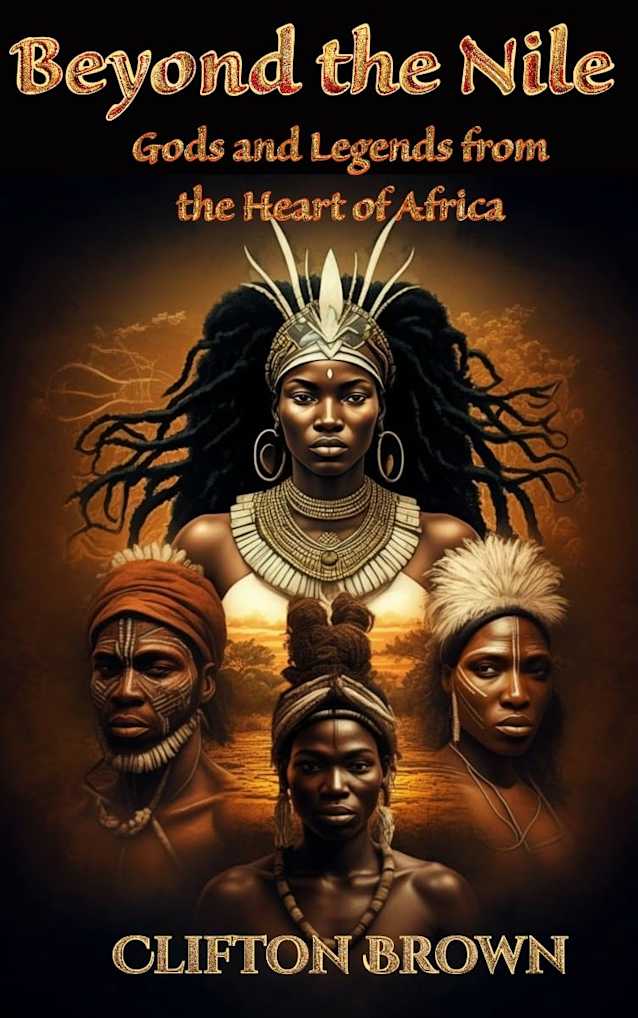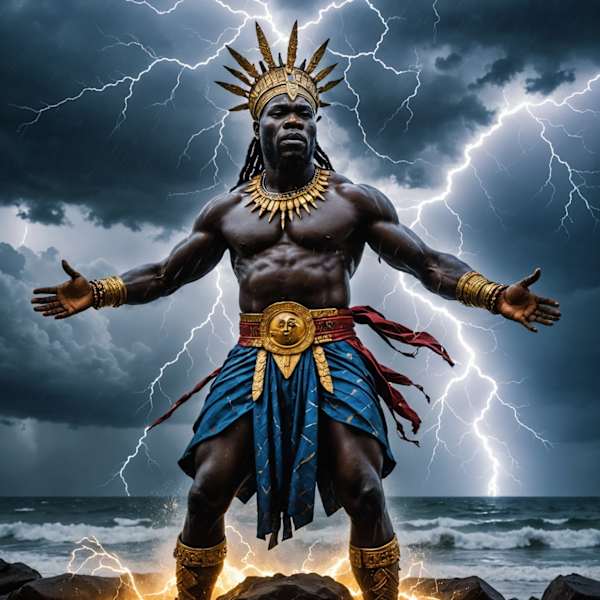Beyond the Nile
About
-Finalist - Global Book Awards - Politics and Social Sciences
I introduce you to Shango, the Yoruba god of Thunder and Lightning! Just one of the many gods tribal storytellers, Griots, spoke of for generations. Find out about him and more!
Growing up, I felt disconnected from my African roots since there was virtually nothing in literature, mainstream media, or the entertainment industry that referenced the rich history and culture that exists there.
I grew weary of reading and watching the mythos of other cultures constantly on display, so I searched for stories from my ancestors.
This book is a primer to introduce you to the plethora of myths and legends available.
Beyond the Nile takes readers on a journey through creation myths, afterlife beliefs, and the legendary deities that have shaped African cultures for millennia—far beyond the well-known myths of ancient Egypt.
In this captivating exploration, you’ll discover:
•The Origin Gods and Goddesses – Meet the powerful deities who shaped the universe, brought life into existence, and continue to influence spiritual traditions today.
•The Fertility and Agriculture Goddesses – Uncover the stories of divine women who nurture the land and ensure abundance.
•Tricksters and Mischief-Makers – Encounter the cunning trickster gods whose wit and chaos shape the fate of both gods and mortals.
•Creation and the Afterlife – How do the peoples of West, Central, and Southern Africa understand the origins of existence and what happens beyond death?
Perfect for mythology lovers, history enthusiasts, and anyone fascinated by the rich spiritual heritage of Africa, Beyond the Nile reveals a vast and diverse pantheon rarely explored in popular media. Whether you’re a casual reader curious about African myths or a seeker of deeper knowledge, this book offers a compelling narrative that will expand your understanding of Africa’s spiritual landscape and its enduring legends.
Praise for this book
Beyond the Nile: Gods and Legends from the Heart of Africa is a stunning achievement by author Clifton Brown, whose storytelling gifts bring ancient myths to life with vivid power and reverence. With every tale, Brown invites readers on a spiritual and historical journey, masterfully blending mythological grandeur with deeply human emotion.
Brown's prose is rich and immersive—his descriptions evoke the sounds of sacred rivers, the shadows of ancestral temples, and the heartbeat of an entire continent. Each story pulses with authenticity, as if passed down directly from the griots and storytellers of old. His careful attention to cultural detail and symbolic nuance honors Africa’s oral traditions while making them accessible to today’s reader.
📚 A Book Club Gem
Perfect for group discussion, Beyond the Nile opens doors to conversations about heritage, spirituality, and the deeper meanings behind myth. Each legend offers something to reflect on—whether it’s identity, resilience, or the divine in everyday life.⏳ Quick Stories, Timeless Messages
These short stories are ideal for readers with busy lives. You can read one legend at a time and still walk away feeling enriched. It’s the kind of book you’ll return to again and again, discovering something new each time.Clifton Brown has given us more than a book—he’s given us a bridge to ancestral wisdom and a beautiful celebration of Africa’s enduring spirit.
Beyond the Nile by Clifton Brown strives to fill a void in literature and media where information about African culture is often lacking. The inspiration for the book came as Brown sought an answer to a personal disconnect that he felt to his roots. He longed to explore the beauty of Africa’s rich history and to discover stories passed down through the generations. The book introduces you to revered water spirits like the Simbi, the visionary Kimpa Vita, and even a trickster or two. Encounter incredible stories, comparative tales, mythological beings, and inspiring fables as you discover how these have continued to inspire. By the end, you’ll see why these stories have had a cultural impact and how they sparked narratives such as those found in Afrofuturism and Wakanda. Each chapter explores a different area of Africa, with a focus on spiritual traditions and their transmission to future generations. The exploration of stories is something that all ages can enjoy, especially those interested in mythology, history, or cultural roots.
The book focuses on the specific areas of Central, West, and South Africa, with deities and stories from these locations. Clifton Brown also highlights how these stories and traditions were passed down primarily through oral storytelling, thanks to those who were dedicated to keeping their knowledge and history alive. A key aspect of these stories is how resilient they are, and despite years of colonization or globalization, the traditions and meaning remain true to the culture. The ultimate goal, and one that Brown succeeds beautifully in achieving, is to highlight a rich heritage that is often overlooked, with Egyptian, Norse, and Greek mythologies often overshadowing it. The author also looks at mythological creatures and fables, giving readers time to reflect on how myths connect to their own heritage. This creates a personal connection to the content and enables you to think deeper about what these myths mean. Beyond the Nile is a lovely collection, drawing you into a rich heritage and beautiful culture that deserves to be explored more.
Beyond the Nile: Gods and Legends from the Heart of Africa by Clifton Brown chronicles his deep dive into African mythologies beyond the Egyptian tradition. Brown speaks on oral traditions of West, Central, and Southern African cultures, discussing key deities like Yoruba’s Olodumare and Shango, Central African figures such as Nzambi a Mpungu and Kimpa Vita, and Southern African spirits like Qamata and Modjadji. He talks about how myths function within societies through rituals, festivals, and storytelling by griots. Brown breaks down trickster figures, fertility deities, and mythic creatures like the Tokoloshe and Mami Wata. His book leans into the transplantation of Yoruba religion to the Americas via the slave trade and discusses Afrofuturism’s role in reimagining African mythology within modern creative contexts, blending heritage with futuristic themes.
Beyond the Nile by Clifton Brown is a fantastic and well-written resource that is, without a doubt, exhaustively researched. Brown pulls together personal anecdotes with stories and history, allowing for the inclusion of cultural beliefs with care and respect, and connecting them and their meaning within the frame of communities. I appreciate that much of Brown's style is conversational, straightforward, and organized, opening up a vital outlet to readers unfamiliar with the specifics of African mythology, and further educating readers who are better versed. Beyond the Nile is unique in the insight Brown delivers into African storytelling traditions, sectioned into professionally constructed chapters and clear, polished presentations. As a cultural analysis, historical social study, and literary guide, this is a welcome and necessary addition to the genre's canon. Very highly recommended.
Beyond the Nile: Gods and Legends from the Heart of Africa by Clifton Brown discusses non-Kemetic deities and mythology. Many people are not aware of the richness of African mythology and the vastness of spiritual practices across the continent. Egyptian deities and mythology take center stage when people think of Africa, but other communities had their own belief systems. These communities relied on oral tradition to pass down wisdom, history, and cultural identity from one generation to the next. In West Africa, the Yoruba community has Olodumare, the supreme creator. Despite his supremacy, Olodumare delegates to other deities, such as Olorun, demonstrating cooperation and harmony. In Central Africa, the Kongo refer to the supreme creator as Nzambi a Mpungu, who is represented by powerful symbols such as the sun and fire. Which other deities are there in Africa?
Beyond the Nile by Clifton Brown is wonderfully written and offers a broader perspective on African mythology and culture. I loved the importance it places on African heritage and how it continues to shape people even today. I believe such literature is a step in the right direction in shedding light on African belief systems. This thought-provoking work also gets one to think about the importance of teaching children their origin and culture. Clifton provides numerous references that can be used to delve into further reading, and the reader will also appreciate the easy-to-understand language used, which makes the work accessible to all audiences. This was a very informative read, and I look forward to reading something else by Clifton Brown.

